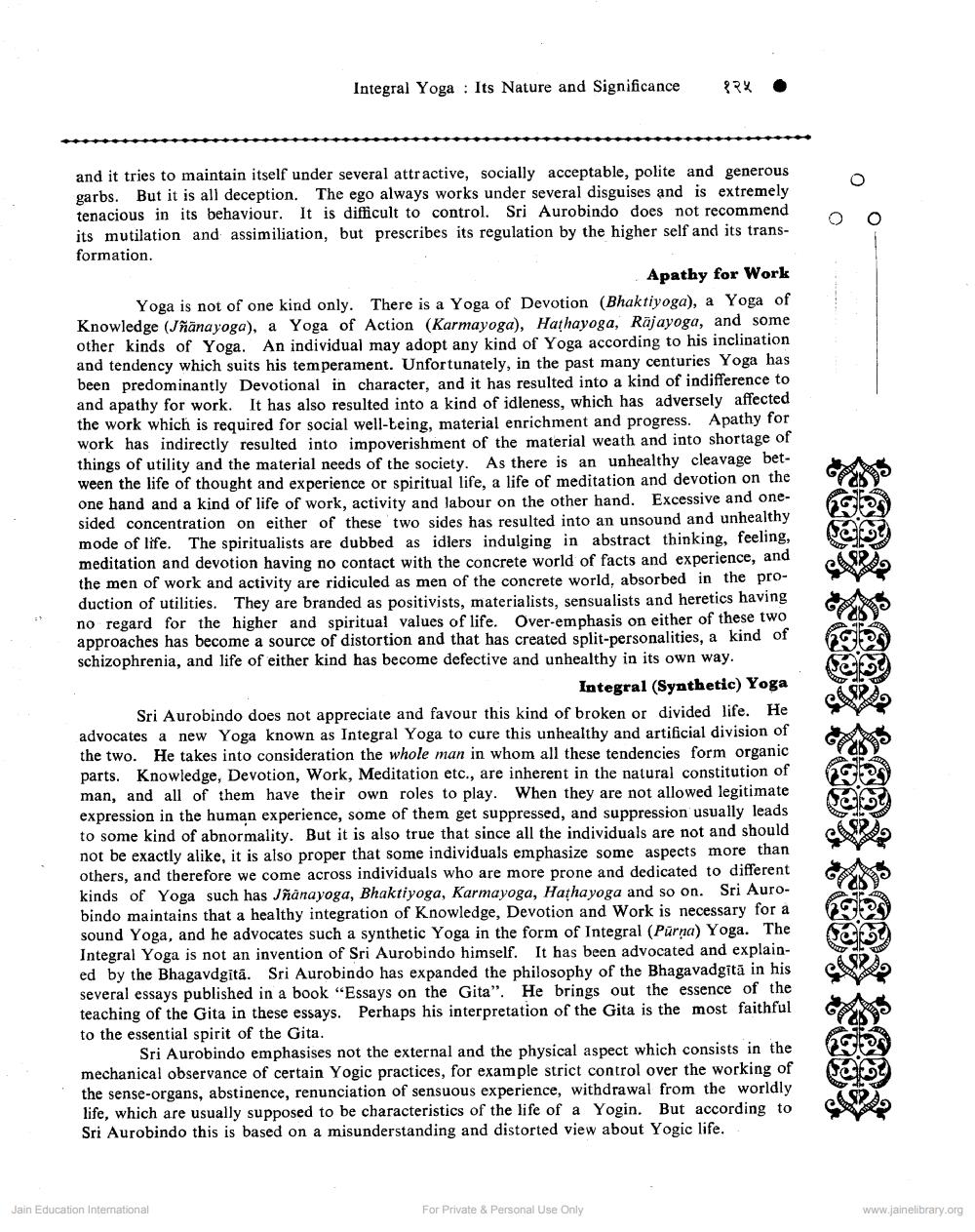Book Title: Integral Yoga Its Nature and Significance Author(s): G N Joshi Publisher: Z_Pushkarmuni_Abhinandan_Granth_012012.pdf View full book textPage 5
________________ Integral Yoga : Its Nature and Significance RX • o and it tries to maintain itself under several attractive, socially acceptable, polite and generous garbs. But it is all deception. The ego always works under several disguises and is extremely tenacious in its behaviour. It is difficult to control. Sri Aurobindo does not recommend its mutilation and assimiliation, but prescribes its regulation by the higher self and its transformation Apathy for Work Yoga is not of one kind only. There is a Yoga of Devotion (Bhaktiyoga), a Yoga of Knowledge (Jñanayoga), a Yoga of Action (Karmayoga), Hathayoga, Rajayoga, and some other kinds of Yoga. An individual may adopt any kind of Yoga according to his inclination and tendency which suits his temperament. Unfortunately, in the past many centuries Yoga has been predominantly Devotional in character, and it has resulted into a kind of indifference to and apathy for work. It has also resulted into a kind of idleness, which has adversely affected the work which is required for social well-being, material enrichment and progress. Apathy for work has indirectly resulted into impoverishment of the material weath and into shortage of things of utility and the material needs of the society. As there is an unhealthy cleavage bet. ween the life of thought and experience or spiritual life, a life of meditation and devotion on the one hand and a kind of life of work, activity and labour on the other hand. Excessive and onesided concentration on either of these two sides has resulted into an unsound and unhealthy mode of life. The spiritualists are dubbed as idlers indulging in abstract thinking, feeling, meditation and devotion having no contact with the concrete world of facts and experience, and the men of work and activity are ridiculed as men of the concrete world, absorbed in the production of utilities. They are branded as positivists, materialists, sensualists and heretics having no regard for the higher and spiritual values of life. Over-emphasis on either of these two approaches has become a source of distortion and that has created split-personalities, a kind of schizophrenia, and life of either kind has become defective and unhealthy in its own way. Integral (Synthetic) Yoga Sri Aurobindo does not appreciate and favour this kind of broken or divided life. He advocates a new Yoga known as Integral Yoga to cure this unhealthy and artificial division of the two. He takes into consideration the whole man in whom all these tendencies form organic parts. Knowledge, Devotion, Work, Meditation etc., are inherent in the natural constitution of man, and all of them have their own roles to play. When they are not allowed legitimate expression in the human experience, some of them get suppressed, and suppression usually leads to some kind of abnormality. But it is also true that since all the individuals are not and should not be exactly alike, it is also proper that some individuals emphasize some aspects more than others, and therefore we come across individuals who are more prone and dedicated to different kinds of Yoga such has Jñanayoga, Bhaktiyoga, Karmayoga, Hathayoga and so on. Sri Aurobindo maintains that a healthy integration of Knowledge, Devotion and Work is necessary for a sound Yoga, and he advocates such a synthetic Yoga in the form of Integral (Pūrņa) Yoga. The Integral Yoga is not an invention of Sri Aurobindo himself. It has been advocated and explained by the Bhagavdgitá. Sri Aurobindo has expanded the philosophy of the Bhagavadgitā in his several essays published in a book "Essays on the Gita". He brings out the essence of the teaching of the Gita in these essays. Perhaps his interpretation of the Gita is the most faithful to the essential spirit of the Gita. Sri Aurobindo emphasises not the external and the physical aspect which consists in the mechanical observance of certain Yogic practices, for example strict control over the working of the sense-organs, abstinence, renunciation of sensuous experience, withdrawal from the worldly life, which are usually supposed to be characteristics of the life of a Yogin. But according to Sri Aurobindo this is based on a misunderstanding and distorted view about Yogic life. Jain Education International For Private & Personal Use Only www.jainelibrary.orgPage Navigation
1 ... 3 4 5 6 7 8 9 10 11 12 13 14 15 16
